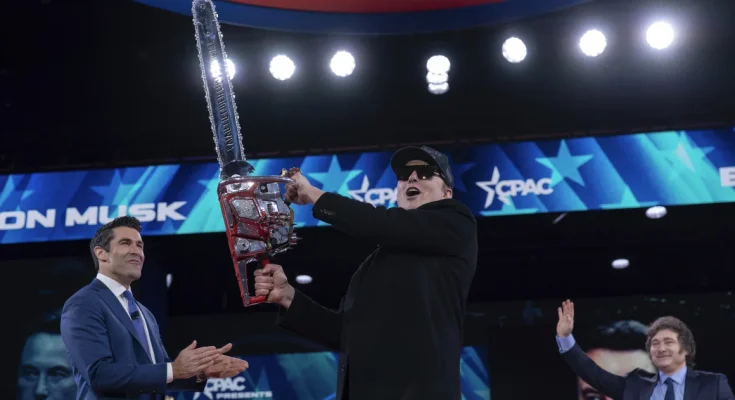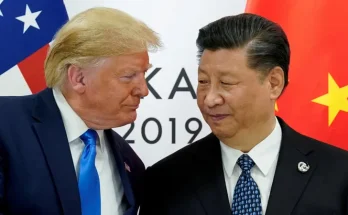Elon Musk has quickly become the focal point of Democratic advertisements and fundraising campaigns nationwide, as party leaders from Virginia to Wisconsin leverage the billionaire tech mogul’s controversial stance on federal budget cuts to energize their supporters and boost donations.
House Majority Forward, a prominent Democratic advocacy group, recently launched targeted advertisements across nearly two dozen pivotal House districts. These ads strategically depict vulnerable Republican incumbents as complicit in drastic budget reductions that threaten healthcare services for children and the elderly, positioning Musk as a central figure who benefits from such policies. Captivating imagery from Musk’s headline-grabbing appearance at the Conservative Political Action Conference—where he theatrically brandished a chainsaw to symbolize his aggressive push for government spending cuts—further reinforces this narrative.
Moreover, Musk prominently features in a compelling digital ad campaign by the Virginia House Democratic Caucus, designed to bolster the party’s slim majority in the state’s House of Delegates. His role doesn’t end there; Musk also stars in influential commercials supporting the liberal candidate vying for a critical judicial seat in Wisconsin, a race with significant implications for the ideological direction of the state’s Supreme Court.
The aggressive advertising campaign is putting Elon Musk, whom Forbes ranks as the richest person in the world, front and center in political debates—testing whether his involvement in federal cost-cutting and government shutdowns will become a political liability for Republicans.
“Musk makes the perfect political villain,” noted Lynda Tran, a Democratic strategist and former Biden administration official. “He dominates the headlines. Like him or not, everyone is talking about him because he’s monopolizing the national conversation.”
Recent polling underscores Musk’s controversial image, suggesting he’s an unpopular figurehead for the administration’s cost-cutting initiatives—particularly among crucial Democratic voters essential for success in off-year elections like those unfolding in Virginia. With the governor’s seat and key state legislative battles at stake, political leaders are contending with voter dissatisfaction driven by Musk-inspired cuts impacting Virginia’s significant federal workforce.
In a recent Marist/NPR/PBS national poll conducted in late February, 50% of respondents viewed Musk unfavorably, while only 39% expressed favorable opinions. This divide becomes even sharper along party lines, with a staggering 96% of Democrats believing Musk holds excessive influence, compared to just 16% of Republicans sharing that view.
Additionally, a Quinnipiac University poll found that 55% of voters nationwide feel Musk wields too much power in American decision-making.
Democratic strategist Jesse Ferguson explains Musk’s unpopularity: “To many Americans, Musk symbolizes someone who fired their relative or outsourced their job overseas. He’s now emblematic of billionaire influence within the Trump administration.”
Musk declined to respond to inquiries from CNN. Yet, he drew attention during President Trump’s joint congressional address, receiving public praise from the president for tackling “appalling waste.” The speech triggered protests from Democratic lawmakers, including Texas Rep. Al Green, who faced formal censure for his actions.
“The Democratic Party showed its disconnect from the American people clearly on Tuesday night,” said Harrison Fields, a White House spokesman, in response to criticism of Musk. “Poll after poll indicates wide public support for the mission of DOGE, and it’s time Democrats faced reality.”
Despite public support from Trump, Musk’s aggressive approach to cuts has sparked significant backlash, leading the president to curb Musk’s authority. Trump recently announced Cabinet members, not Musk, will oversee staffing decisions within their agencies, advocating for more precise cost reductions going forward—opting for a “scalpel” rather than Musk’s “hatchet” style.
Beyond Washington, Musk is leveraging significant political and financial influence in state-level races, notably in Wisconsin’s critical Supreme Court election. Musk, who previously contributed nearly $300 million toward electing Trump and other Republicans, is dramatically shaping the election battle to fill a pivotal seat on Wisconsin’s seven-member court.
Musk’s political action committee, America PAC, has already poured $3.2 million into backing conservative candidate Brad Schimel, while a Musk-funded group, Building America’s Future, has contributed an additional $2 million. The high-stakes April 1 election could shift the court’s current liberal majority to conservative, impacting major decisions on abortion rights, labor rights, and even Tesla’s ongoing legal battle regarding dealership laws in Wisconsin.
Democratic groups backing Schimel’s opponent, Susan Crawford, are aggressively countering with anti-Musk advertisements and a significant public outreach campaign, including the launch of a “People v. Musk” website. The battle lines are drawn, and Musk remains at the very heart of a political showdown with national implications.
Battle for Wisconsin: Political Ads, Big Money, and the Musk Factor
A political firestorm is brewing in Wisconsin as billionaire Elon Musk becomes a central figure in the state’s high-stakes court race. A Better Wisconsin Together Political Fund, a group backing candidate Susan Crawford, has launched aggressive ads accusing Musk of “causing chaos” in Washington and attempting to “buy” a seat on the state’s highest court.
Meanwhile, Crawford’s campaign is using Musk’s involvement as a rallying cry for donations. One campaign ad calls for urgent contributions to help her “fight back, fast” against the billionaire’s financial influence. And the strategy seems to be working—according to Crawford’s spokesperson, Derrick Honeyman, the campaign pulled in more than 36,000 individual grassroots donations in a single week—eclipsing the 30,000 donations it had received from its launch last June through early February.
But Crawford isn’t the only one with deep-pocketed backers. Billionaire donors like George Soros and Illinois Governor JB Pritzker have contributed to the Wisconsin Democratic Party, which has funneled money into Crawford’s campaign. This has sparked sharp criticism from her opponent, Republican Brad Schimel’s team.
“Susan Crawford and the Democrats are trying to distract Wisconsinites from her extreme views while benefiting from radical billionaire donors themselves. The hypocrisy is laughable,” said Schimel campaign spokesperson Jacob Fischer in a statement to CNN.
The Musk Factor in Virginia’s Elections
While Wisconsin heats up, Virginia Democrats are also making Musk a central villain in their campaigns. As the billionaire pushes to slash the federal workforce, state Democrats are warning voters about the devastating impact on government employees and their families.
“Musk is taking a chainsaw to people’s lives and livelihoods,” said Virginia Delegate Dan Helmer, chair of the Democratic campaign efforts for the state’s House of Delegates. Virginia, home to more than 144,000 federal civilian workers, could feel the brunt of Musk’s cost-cutting efforts.
Democrats, who currently hold a slim 51-49 majority in the House of Delegates, are tying vulnerable Republican incumbents to Musk, hoping to flip critical districts. Their strategy targets 12 GOP lawmakers, including eight in districts that Vice President Kamala Harris won in 2024.
While Harris carried Virginia overall, Trump made gains in the state, improving on his 2020 and 2016 performances. Political analysts suggest Democrats’ focus on Musk could sway Trump supporters who are uneasy about federal spending cuts.
“Emphasizing Musk helps reach Trump voters who fear deep cuts to federal jobs and programs,” said Kyle Kondik, managing editor of the political newsletter Sabato’s Crystal Ball at the University of Virginia.
However, some warn that making Musk a campaign villain could backfire.
“The danger of going after Musk is that he has unlimited resources,” said a Democratic strategist. “Attacking him might only motivate him to pump even more money into the race.”
Early Focus on the 2026 Midterms
Meanwhile, national Democrats have already turned their sights to the 2026 midterms. This week, House Majority Forward, the nonprofit arm of the leading House Democratic super PAC, launched a new wave of ads targeting Republicans for failing to lower the cost of living and prioritizing tax cuts for the wealthy—like Musk—over healthcare spending.
The ads call out House Republicans for backing a budget plan that seeks $880 billion in savings over a decade, with critics arguing that Medicaid could be in the crosshairs. Although GOP leaders and Trump insist they won’t cut Medicaid benefits, Democrats are seizing the opportunity to paint them as favoring the rich over everyday Americans.
“Republicans are trying to kick people off Medicaid to give billionaires a tax break,” the new Democratic ads claim.
Republicans, however, dismiss the attacks as fearmongering.
“The Democrat Party is sinking fast. They have no message, no agenda, and no support,” said NRCC spokesman Mike Marinella. “Now they’re resorting to the same tired playbook of shameless fear tactics and outright lies.”
With the 2026 midterms approaching, the battle over big money, powerful billionaires, and political influence is only just beginning.



